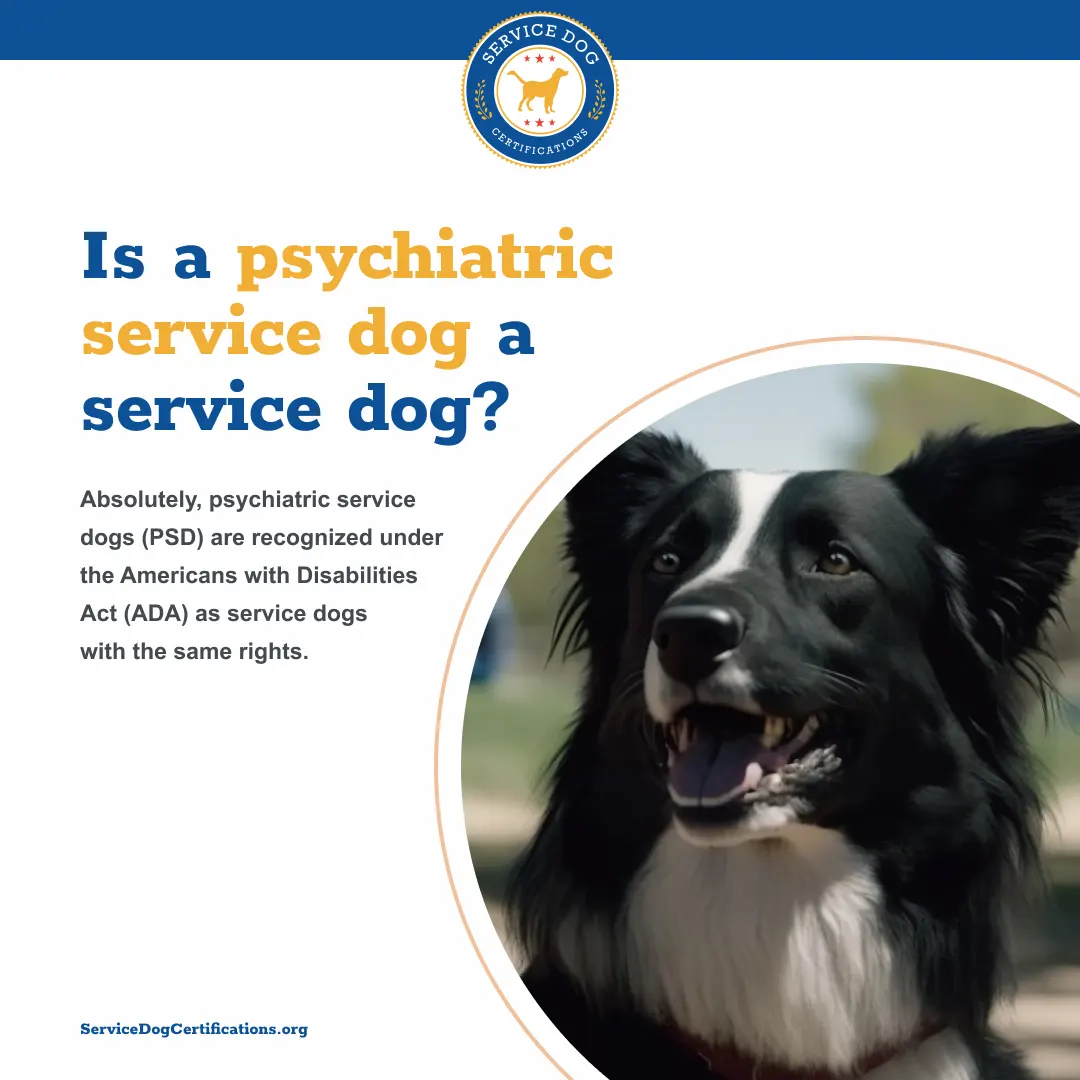Home Page › Blog › Is a Psychiatric Service Dog a Service Dog?
Is a Psychiatric Service Dog a Service Dog?

The short answer: Absolutely, psychiatric service dogs are recognized under the Americans with Disabilities Act (ADA) as service dogs with the same rights.
What is a psychiatric service dog (PSD)?
Many people think service dogs only help with physical disabilities. For example, guide dogs help those with diminished vision, alert dogs for the deaf, or service dogs pull wheelchairs for the mobility impaired.
A psychiatric service dog is a type of service dog that helps handlers with mental health disabilities. The ADA defines these mental health conditions as “any mental or psychological disorder” such as “emotional or mental illness, and specific learning disabilities.”
Psychiatric service dogs help people with conditions like debilitating depression, severe anxiety, PTSD, and ADHD. Like a service dog for physical disabilities, however, a PSD must be trained to perform a job or task relating to the handler’s disability.
ServiceDogCertifications.org
PSDs can perform countless tasks. Examples of tasks that the ADA cites are reminding a person with mental illness to take prescribed medications and calming a person during an anxiety attack.
How can you know if someone has a PSD?
It can be tricky to tell if someone has a PSD because mental illnesses are usually invisible. When it’s not obvious that the dog is a service animal, staff can ask two questions:
- Is the dog a service dog required for a disability?
- What work or task has the dog been trained to perform?
PSD owners also find it helpful to use service dog accessories like ID cards, vests, tags, and certificates so that others know their dog is on duty. However, no one can insist you provide these items as a condition of entry.
Some PSD handlers are wary of public interactions and the possibility of someone playing with their dog while it is working. The items mentioned above can help reduce these concerns. Many PSD owners will also obtain PSD letters to verify if they have a qualifying condition.
What rights do psychiatric service dogs have? ⚖️
The Americans with Disabilities Act recognizes psychiatric service dogs on equal footing with other types of service dogs. That means that PSDs have all of the legal rights that service dogs for physical disabilities have. That includes access to public areas normally closed off to dogs. PSDs must also be accommodated in no-pets residential buildings, free of charge.
Is a psychiatric service dog the same thing as an emotional support animal?
No, the ADA distinguishes between PSDs trained to perform a task directly relating to the handler’s disability and animals that solely provide comfort or emotional support. Both help with mental illnesses, but service dogs undergo specialized training, whereas ESAs do not.
To qualify for an emotional support animal, you need a letter from a licensed healthcare professional. ESAs have housing rights but no broader public access rights.

Share this image on your site
About the Author: The writing team at Service Dog Certifications is made up of folks who really know their stuff when it comes to disability laws and assistance animals. Many of our writers and editors have service dogs themselves and share insights from their own experiences. All of us have a passion for disability rights and animals.
Latest Posts

How to Bring a Service Dog to Disneyland
Trained service dogs are more than welcome to join their handlers at Disneyland. In this guide, we’ll explain Disneyland’s policies and give practical advice for bringing a service dog to Disneyland for the first time. Disneyland’s Service Dog Policies The Magic Kingdom is happy to welcome trained service dogs across most park locations! They kindly […]

Read More

Can Dogs Eat Tomatoes?
Yes! Dogs can safely enjoy tomatoes, but there are a few risks to be aware of so you can feed your dog responsibly. Fully ripe tomatoes (without the stems and leaves) can actually have nutrients that are good for your pup. Tomatoes have chlorogenic acid, an antioxidant that can have anti-inflammatory effects in cells. They’re […]

Read More

Can a Primary Care Doctor Write an ESA Letter?
Your family doctor, also called a primary care physician (PCP), can write a letter recommending an emotional support animal. We’ll explain what legally gives them that ability and explore what better options might be available for you. Why are Physicians Able to Write an ESA Letter? To turn your pet into an emotional support animal, […]

Read More






